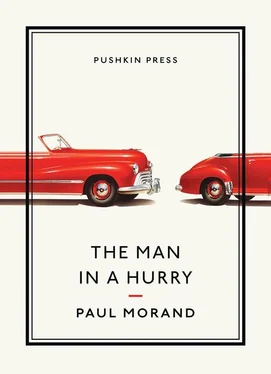They began at the beginning, with the fifty-ton objects that were impossible to lift, with the granite sphinxes doomed to remain for all eternity amid the dampness of the ground floor, with the stone Molochs, with all the simulated gods that would never reach a higher floor in any gallery and that would break the floorboards were they to be moved upstairs. Pierre Niox and his flock walked at a goodly pace and the noise of the women’s heels echoed on the stone slabs. Angélique wanted to stop, saying that she “adored” these monsters, their solitariness and their impotence, and that she could understand lovers arranging to meet in their shade. She emphasized this point eagerly, which surprised Pierre.
They inspected the ranks of obsolete gods, arranged by the Beaux-Arts in an eternal and administrative symmetry.
“Whose idea was it to collect all this?” asked Hedwige.
“The Renaissance, the Convention and the Second Empire,” Pierre replied. “The Louvre owes everything to them. It’s the poor periods that make the best collections.”
Followed by his three Graces, he strode past the antique sculpture, made his way through the Middle Ages, talking a great deal all the while. Angélique thanked him for “adding so much to her artistic knowledge”, which irritated Pierre because she was hopeless, mistaking Trajan’s column for the Vendôme column, the Bols for the Rembrandts, and going into raptures over the plaster casts as though they were original work. To please her guide, Angélique exaggerated her enthusiasm, not wishing to miss a single drawing.
“There are forty-eight thousand of them,” said Pierre.
Angélique adopted a studiously stooping attitude and pretended to ponder over the masterpieces, which got on Pierre’s nerves, particularly as the only things she called masterpieces were either under glass or those immediately in front of the benches. She discovered resemblances in every painting: a Frans Hals reminded her of Uncle Rocheflamme; Guercino’s Faith, Hope and Charity at the Feet of God represented herself and her sisters grouped around Mamicha.
Pierre, beside himself, dropped her off at the Clock Pavilion counter.
Pierre preferred the other two sisters because of their passivity. He snatched them away as though they were succulent prey and began to pace through the Apollo Gallery. The Venuses, the Hercules, the marbles and the bronzes, the pots and the vases did their best to solicit them as they passed, but their charms were to no avail. Pierre would not tolerate anyone liking what he disliked. He scanned the room with his eagle eye, trusting in his own dazzling good taste, and led his companions directly to the rare or perfect object. Hedwige followed, feeling rather irritated herself; firstly because she was not the object of any particular attention on Pierre’s part, and also because her foot was painful, due to a new inner sole. Her head was spinning. She had the feeling she was falling down a precipice of colours and draperies, into a pit of gilt frames writhing with school mythologies.
Pierre dismissed the minor Dutch masters and the effete Italians with all the disrespect due to them.
“Straight to the summits!” he cried, and despite Hedwige’s timid attempt to confess a liking for the Primitives, he dragged her off to the Spanish and French eighteenth-century schools. Scarcely had he reached Goya than she begged for mercy.
“Pierre Niox is the devil in person!” said Fromentine to Hedwige, laughing as she spoke.
“It was the devil who took Jesus Christ up the mountain and showed him the view,” replied Pierre, who had overheard.
Hedwige was not joking. She was in such pain that she felt she was being burnt on a slow flame. She would have preferred not to leave Pierre alone with Fromentine, who was following him at a brisk pace, having adopted his long stride. But her longing to take her shoes off was more powerful. She left them on their own. It was agreed they should meet in the Salon Carré, at closing time.
Fromentine glanced over her shoulder frequently: she could glimpse Hedwige in the distance, growing smaller and smaller, looking initially like a moving portrait, then like a character in an indoor painting, then like a miniature; eventually she disappeared entirely. Pierre and Fromentine set off together. The girl was determined to inflict unintelligible chatter on her companion, her gibberish spouting from a mouth buried in her fur, but he gazed only at her bottle-green eyes and the reddish curls trapped in between the silver-fox on her hat and that on her collar. The most spacious galleries opened up before them now like paths replete with gold and allegories. The Sabine women reached out their arms to them and the shipwrecked survivors of the Raft of the Medusa their fists; athletically, they sped past them. Pierre had finally met someone who could keep up with him; he led the way, but without walking ahead of Fromentine, who easily kept pace with him. She moved freely, proud of her conquest and happy to have the man entirely to herself and to be rid at last of all his paintings and statues, about which she understood nothing; it suited her youthfulness that this Louvre, intended for the study of fine arts, should be transformed into a playground; it struck her as normal to be the only working masterpiece there, the only living statue.
Pierre was fully aware of the attractions of this adaptable and supple companion, who followed him with obedient ease and wore low rubberized heels. Fromentine indulged his weaknesses.
“This is the way I like to visit museums,” she said, “you really do know how to see!”
“And choose,” Pierre replied.
She looked at him with a radiant and firm gaze, trying to give the verb that he had uttered without any ulterior motive a romantic, fateful meaning.
“You have to know a great deal to be able to choose,” she added with schoolgirl admiration. “You probably have to have loved a great deal and suffered a great deal.”
“I’m a good coach.”
“Most of all, you’re a good teacher. And not in the least weird, whatever people say. I pretend to move slowly because that’s how the family moves, but I never get tired. In the mountains, I scatter the hordes. Phew! I’m so hot!”
“Let me take your bag and your silver-fox.”
“I’d never allow a man to carry anything.”
She joked teasingly about gentlemen who offer to take your clothing and who, when you hand it to them, don’t forgive you.
They were now striding through the schools, the countries, the glories, the centuries. It was becoming a race, a splendid competition that left art-lovers astonished and wardens amazed. The partitions of the Louvre were turning into hedges and the polished staircases into rivers.
They were hardly speaking to one another any more, they were aiming purely to outdo each other, they “justified themselves through distance”, to use Fromentine’s words. She admired this tall fellow, who was energetic and efficient, as calm in his activities as he was sitting in an armchair; from time to time she asked him the odd opinion as she would a true friend, and when he gave it to her she would respond simply with pious silence and an earnest, thoughtful demeanour.
She certainly had a hold on him, this man in a hurry. With a sure instinct, she had seen through his weaknesses, and she was entering into his lively, perverse game with the innocent dishonesty of virgins.
“I’m not like Angélique,” she would say, “I don’t enjoy painting at all. All I enjoy is exercise. I seek whatever delights me, whatever uplifts me, what transports me!”
With that complete lack of discernment characteristic of men whose quirks are encouraged, Pierre considered Fromentine to be loyal, honest and natural.
Читать дальше












